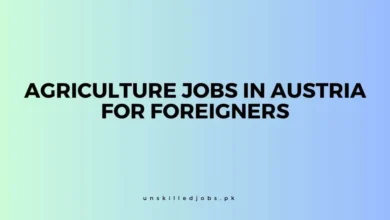Visa Sponsorship Agriculture Jobs in Luxembourg 2024

You have arrived at the right location if you have a passion for gardening and are seeking visa-supporting employment in Luxembourg. Agriculture-related employment opportunities in Luxembourg that facilitate visas present exceptional prospects for individuals seeking employment in this industry.
Numerous employers in Luxembourg recognize the importance of ubiquitous ability and sponsor visas for qualified candidates. Explore the stimulating opportunities to contribute to Luxembourg’s agricultural landscape while taking advantage of the country’s cultural wealth and financial stability.
Details of Visa Sponsorship Agriculture Jobs in Luxembourg
- Job country: Luxembourg
- Industry: Agriculture
- Job Type: Different roles in agribusiness (specify if it’s farming, research, etc.)
- Any Age Limit: There is generally no particular age limit.
- Employment Term: Full-time, Part-time, Regular (Specify as per job)
Responsibilities of Agriculture Jobs in Luxembourg
The cultivation and management of crops.
- Implementing cultivation practices that are sustainable.
- Observing and managing epidemics of pests and infections.
- Maintaining and operating rural equipment.
- Compliance with natural regulations is being ensured.
- The processes of harvesting and post-harvesting crops.
- Analysis of the soil and nutrient management.
- Irrigation system admin.
- Performing task coordination and overseeing cultivating labor.
- Maintaining records of expenditures and crop yields.
- Receiving and conducting research on novel technologies.
- Maintaining apparatus and infrastructure related to cultivation.
Benefits of Agriculture Jobs
- Job Contentment: Dealing with the soil, crops, or animals directly brings satisfaction to many people. It can be satisfying to assist with the community’s food and resource production.
- Diverse Roles: Numerous career options are available in the agriculture sector, including those in farming, agribusiness, research, extension services, marketing, and other fields. People can discover roles that align with their interests and skill sets because of this diversity.
- An outdoor workspace: Many occupations in agriculture offer the chance to work outside in nature, whether it’s on a farm, in a vineyard, or doing field research, for individuals who want that kind of work.
- Career Consistency: Since agriculture is a basic business, jobs in this field are frequently seen as stable. There will always be a need for qualified workers because food and agricultural products are necessities.
- Prospects for Starting a Business: Many people who work in agriculture have the opportunity to launch their agribusinesses or farms. Possibilities for entrepreneurship can result in freedom and the power to direct one’s professional trajectory.
- Cutting-edge technology: The agriculture sector has welcomed technological advancements. Working with cutting-edge technologies like precision agriculture, drones, and sophisticated gear is a common possibility for professionals in this industry.
- Worldwide Prospects: A worldwide industry is agriculture. Professionals may be able to collaborate across cultural boundaries, operate abroad, and support global food security.
- Social Impact: Working in agriculture enables people to produce food, boost regional economies, and support sustainable practices, all of which directly benefit local communities.
- Opportunities for Research and Education: Agricultural professionals frequently have access to on-the-job training, research organizations, universities, and other educational and research possibilities.
- Ecological Guardianship: Environmentally sustainable methods are part of employment in agriculture. Specialists in this area may support biodiversity, conservation initiatives, and ethical land management.
- Governmental Assistance and Rewards: Certain governments offer subsidies, grants, or advantageous tax policies to persons operating in the agriculture sector as a means of assistance and incentives.
- Well-being and Health: Many professions in agriculture involve outdoor work and physical activity, which can help lead to a healthy lifestyle. Having access to locally grown, fresh food can also improve one’s health.
Check Also: Driving Jobs in Luxembourg Visa Sponsorship
Requirements for Agriculture Jobs in Luxembourg
- A bachelor’s degree in a pertinent discipline, such as agriculture.
- Understanding of regional and global agrarian developments.
- Expertise in crop rotation and planning.
- Knowledge of organic agricultural methodologies.
- Expertise in operating rural equipment.
- Comprehend methods of vermin and disease control.
- Irrigation framework expertise and water management knowledge.
- Proficiency in evaluating soil test outcomes.
- Outstanding administrative and organizational abilities.
- Environmental control awareness in the agricultural sector.
- Expertise in interpersonal relations and communication.
- Willingness to adapt to novel agricultural innovations.
Various Agriculture Jobs
Farm Management Positions:
The agricultural sector in Luxembourg comprises a variety of establishments, from conventional family-owned businesses to contemporary, specialized farms. Agricultural development, daily operations, and animal management are all profoundly influenced by farm administrators. A considerable number of these positions offer visa sponsorship, thereby rendering them accessible to candidates worldwide.
Agricultural Research and Development:
By contributing to rural investigations, Luxembourg is enhancing their maintainability and efficacy. Accessible are positions associated with agrarian research and development, including agronomist and research examiner positions. These positions facilitate the advancement of cultivation methodologies and select establishments provide visa sponsorship in order to entice international personnel.
Viticulture and Winemaking
Luxembourg, a country with a rich heritage, features a picturesque landscape dotted with vineyards. Professions associated with viticulture and winemaking, including vineyard directors, cellar specialists, and oenologists, offer dynamic employment opportunities. Several wineries provide visa sponsorship for individuals who are proficient in these fields.
Supply Chain Management and Agribusiness:
Experts in supply chain management, coordination, and agribusiness enhancement are in high demand. To attract a talented and diverse workforce, organizations across various sectors frequently provide sponsorship for visas.
Greenhouse and Cultivation Positions
As the importance of sustainability increases, nursery and cultivation employment is growing. Demand is high for positions including nursery directors, horticulturists, and scene architects. The environmental initiatives of Luxembourg render these positions appealing to individuals who are enthusiastic about sustainable agriculture.
Governmental Rural Agencies
Agriculture-specific governmental organizations in Luxembourg direct policies, initiatives, and subsidies. Agricultural examiners, policy investigators, and advisors are a few of the positions within these organizations that provide opportunities to contribute to the agrarian development of the nation. Certain positions may offer visa sponsorship for eligible applicants.
Agricultural Technology (AgTech)
Luxembourg is not exempt from the expanding pattern of agricultural innovation and integration. AgTech enterprises consistently seek professionals with expertise in precision farming, data analysis, and rural design. Frequently, sponsorship for visas is extended in an effort to recruit qualified individuals who can make technological contributions to agriculture.
Conclusion
The agribusiness division of Luxembourg offers a variety of employment opportunities to individuals with diverse interests and skill sets. Numerous of these positions are eligible for visa sponsorship, which furthers Luxembourg’s appeal as a destination for individuals interested in pursuing a farming profession while immersing themselves in the country’s vibrant social and economic environment. With the nation’s continued advancements in sustainable and novel agricultural methodologies, there will inevitably be a growing need for skilled professionals, which will create opportunities for universal candidates.
Frequently Asked Questions:
-
Does Luxembourg have good agriculture?
The agricultural area represents 53% of the country’s surface area, with the forest area accounting for 36%. 6% of Luxembourg’s agricultural area is under organic farming, with 114 organic farmers in 2020.
-
How many farmers are there in Luxembourg?
Today, approximately 2,600 farms (1970, still 7,600 farms) with about 126,000 hectares of agricultural land are still in operation. Milk and cattle production plays a dominant role, and in comparison, the income from horticulture and special cultures is minimal.
-
What is the main crop in Luxembourg?
The country’s main focus in agriculture is on a limited number of products, these being milk, wheat, wine, and cereals. The biggest crops in Luxembourg are wheat and spelled, which together account for 14,494 hectares of farmland. Corn, barley, triticale, and rapeseed come after this.





